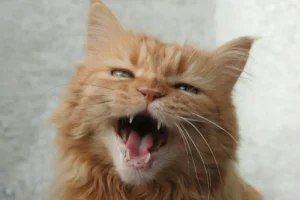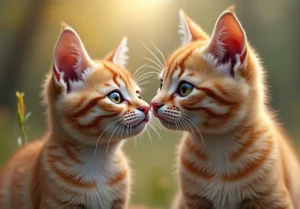Cats are notorious for their insatiable appetites, constantly meowing for more food despite just being fed. But why are cats always hungry? Let’s delve into the reasons behind their bottomless pit of a stomach.
The Science Behind Cat Appetite
Cats are notorious for always seeming hungry, and there are scientific reasons behind this constant appetite. One key factor is their high metabolism. Cats have a faster metabolism compared to humans, which means they burn calories at a quicker rate and need to eat more frequently. Additionally, natural hunting instincts play a role in their constant hunger. In the wild, cats would hunt and eat multiple small meals throughout the day, so this behavior is ingrained in their biology.
Common Feeding Mistakes
When it comes to feeding our feline friends, there are certain mistakes that can contribute to them always feeling hungry. Overfeeding is a common pitfall, as giving too much food can lead to weight gain and increased hunger. Free-feeding, or leaving food out all day for cats to graze on, can also contribute to this issue. Cats may struggle with portion control when food is always available, leading to a constant desire to eat. Lastly, feeding low-quality food can leave cats feeling unsatisfied and hungry, as their nutritional needs may not be met.
- Avoid overfeeding: Stick to recommended portion sizes to prevent weight gain and excessive hunger.
- Limit free-feeding: Establish set meal times to help regulate your cat’s eating habits and prevent constant hunger.
- Choose high-quality food: Opt for nutritious cat food that meets your pet’s dietary needs, helping them feel full and satisfied after meals.
By understanding the science behind cat appetite and avoiding common feeding mistakes, you can help ensure your feline friend stays healthy, happy, and satisfied.
Health Issues and Hunger
Is your cat constantly begging for food? It might not just be a case of a big appetite. Certain health conditions could be causing their increased hunger levels. Conditions like hyperthyroidism or diabetes can lead to excessive hunger in cats.
Hyperthyroidism is a common condition in older cats where the thyroid gland produces too much thyroid hormone. This can cause your cat’s metabolism to increase, leading to a voracious appetite. On the other hand, diabetes can also result in increased hunger as the body is unable to regulate blood sugar levels effectively.
If you notice your cat constantly looking for food, it might be worth a trip to the vet to rule out any underlying health issues.
Psychological Factors
Have you ever considered that your cat’s constant hunger might be linked to their emotions? Stress, boredom, or anxiety can all manifest as excessive hunger in cats, leading them to constantly beg for food.
Just like humans, cats can experience stress and anxiety which may result in seeking comfort in food. If you’ve recently moved house, introduced a new pet, or experienced any changes in your cat’s environment, they may be feeling anxious and seeking solace in food.
To address this issue, try engaging your cat in interactive play, providing stimulating toys, and creating a safe and calm environment to alleviate any stress or boredom that may be driving their endless hunger.
Tips for Feeding Cats
If your feline friend seems to be constantly hungry, it’s essential to establish a proper feeding routine. Start by ensuring you are feeding your cat the right amount of food according to their weight and age. Overfeeding can lead to excessive hunger and weight gain. Additionally, consider spreading out meals throughout the day rather than offering one large meal. This can help regulate their appetite and prevent them from begging for food constantly. Remember to provide fresh water at all times to keep your cat hydrated and healthy. By implementing portion control and meal scheduling, you can help curb your cat’s constant hunger and establish a healthy feeding routine.
Alternatives to Food
Cats are not only motivated by food but also by mental stimulation and play. If your cat always seems to be hungry, try incorporating interactive toys, puzzle feeders, and scratching posts into their environment. These items can provide mental enrichment and physical activity, helping to distract your cat from constantly seeking food. Additionally, spending quality time playing and bonding with your cat can help satisfy their need for attention and reduce their focus on food. By engaging your cat in stimulating activities and offering alternatives to food, you can prevent them from feeling hungry all the time.
- Engage your cat in regular play sessions to keep them mentally stimulated and physically active.
- Provide scratching posts and climbing structures to fulfill their natural instincts and prevent boredom.
- Use puzzle feeders or interactive toys to challenge your cat’s problem-solving skills and keep them entertained.
- Rotate your cat’s toys regularly to prevent them from losing interest in them.
- Consider introducing a variety of textures and materials in their environment to keep them engaged and curious.
By incorporating these alternative activities into your cat’s daily routine, you can help fulfill their needs beyond food and prevent them from constantly feeling hungry.
Homemade Treat Ideas
Treat Time! If your furry friend is always begging for food, try making some homemade treats to help curb their hunger. Here are a few simple recipes you can whip up in no time: – Tuna Treats: Mix a can of tuna with a bit of flour and water, then bake until crispy. Your cat will love these fishy snacks! – Chicken Delights: Cook some chicken until it’s nice and tender, then shred it into small pieces. Your cat won’t be able to resist! – Pumpkin Purr-fects: Mix canned pumpkin with a sprinkle of catnip and freeze into small bite-sized pieces. A tasty and healthy treat for your hungry kitty.
Remember, treats should be given in moderation to avoid weight gain. Your cat will appreciate the extra love and attention through these homemade goodies!
Understanding Your Cat’s Body Language
Cat Communication 101! Is your feline constantly meowing for more food? It may not be just hunger driving their behavior. Pay attention to your cat’s body language to decode their cravings: – Persistent Purring: If your cat is purring excessively around meal times, they may be associating food with comfort and attention. – Kneading and Nuzzling: When your cat kneads on you or nuzzles your hand, it could be a sign of seeking comfort rather than food. – Staring and Meowing: Cats may meow and stare at their food bowls not necessarily out of hunger but as a way to communicate with you.
By understanding your cat’s unique cues, you can determine if their hunger is genuine or if they’re craving something else, like affection or playtime. Stay attuned to their signals to ensure a happy and healthy kitty!
Fun Facts About Cat Nutrition
Did you know that cats are obligate carnivores, meaning they need a diet primarily consisting of meat to thrive? So it’s no wonder why they always seem hungry!
In fact, a cat’s digestive system is designed to digest animal protein efficiently, which is why they may appear to have bottomless stomachs. Their wild ancestors would eat multiple small meals throughout the day, a behavior that has been passed down to our domestic feline friends.
Another interesting tidbit is that cats have a higher protein requirement compared to many other animals. This is because they use protein not just for energy but also for essential bodily functions like maintaining muscle mass and healthy skin and fur.
Moreover, cats have taste buds specifically tuned to detect amino acids, the building blocks of protein. This may explain their preference for meat-based foods and why they always seem to be on the hunt for their next meal.
So, if your cat is always asking for food, remember it’s just their natural instinct as obligate carnivores to seek out the protein-rich meals they need to stay healthy and satisfied.
Top Foods to Keep Your Cat Satisfied
- High-Quality Proteins: Opt for cat foods with real meat as the first ingredient to meet your feline friend’s nutritional needs.
- Moderate Fat Content: Cats need fats for energy, but too much can lead to obesity, so choose foods with a balanced fat content.
- Hydration is Key: Wet cat food can provide essential moisture, especially for cats who don’t drink enough water.
- Avoid Fillers: Look out for foods with excessive fillers like corn or soy, as they offer little nutritional value for your hungry cat.
Keep these food tips in mind to help your cat feel full and content throughout the day, satisfying their natural craving for meat-based meals.
Alex, a passionate animal lover, has experience in training and understanding animal behavior. As a proud pet parent to two dogs and three cats, he founded AnimalReport.net to share insights from animal experts and expand his knowledge of the animal kingdom.




